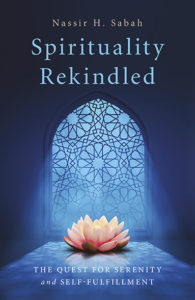(Original article: Mystic Living Today, January 2024)
Nassir H. Sabah
When discussing religion, one should carefully differentiate between its spiritual/doctrinaire aspect and its institutional/practiced aspect. The latter involves human intervention, which almost inevitably corrupts the former to varying degrees through unintentional or willful misinterpretation or deliberate exploitation for malicious and unholy purposes. Conflating the essence of religion with what is said or done by some in the name of religion is not only wrong and unjust but can cause unwarranted spurning of religion.
Spirituality in the context of religion, as advocated in the book, Spirituality Rekindled, is a quality of being predicated on a sense of connectedness to God Almighty, the creator of the universe and the guide and sustainer of everything in it. It is argued that this spirituality is the most characteristic, innate human attribute that is ingrained in the human psyche but is suppressed in most people by being stigmatized as superstitious, naïve, and unscientific. It is reasoned that this spirituality is not incompatible with science but ventures beyond the scope and limitations of present-day science. Repudiating the supernatural in the name of science is like a blind man denying the existence of what he cannot see.
The advocated spirituality is beyond any religious affiliation because it depends on a sense of direct, personalized connectedness to God, which can be experienced by anyone belonging to any religion based on belief in God. It can even be embraced by atheists or agnostics, once they get to believe in God and in His attributes, without having to follow any particular religion. This emphasizes the distinction between the two aforementioned aspects of religion.
How is this spirituality cultivated? The book, Spirituality Rekindled, presents a comprehensive and manageable roadmap for the advocated spirituality in terms of five constitutive building blocks:
- Foundational beliefs, or underlying convictions, which are a firm belief in the existence of God, in His attributes, and in the afterlife.
- Profound feelings engendered by these foundational beliefs, mainly deep humility toward God’s indescribable greatness, majesty, and glory, and the inescapable choice of full submission to His will.
- Occupying thoughts predicated on these beliefs and feelings and centered on sustained remembrance of God, whether in glorification, gratitude, supplication, or in some personalized forms.
- Formative attitudes, as dispositions emanating from the aforementioned beliefs, feelings, and thoughts. Foremost is reliance on God and deference to His will, as explained in the article of this title in the December 2023 issue of Mystic Living Today. These attitudes encompass one’s views of life in general, such as the measure of success in life, what is truly important in life and what is vain and superfluous.
- Virtuous conduct, as the behavioral manifestation or embodiment of all the preceding.
It should be emphasized that the advocated spirituality has the following distinctive features:
- It is not about dedicating time for regular, special prayers or meditative-type practices. It is about having God Almighty as our guide, solace, and refuge throughout our everyday life.
- What really counts in the end are not just thoughts, feelings, and intentions, but concrete manifestations as virtuous conduct in good deeds and moral behavior towards all around us, including other human beings, other forms of life, and the environment.
- Virtuous conduct is fostered through continual and comprehensive self-development – spiritually, psychologically, morally, and intellectually – which elevates us to being better human beings in every sense.
- The advocated spirituality is cultivated within an all-embracing worldview that provides easily comprehended, coherent, convincing, and satisfying answers as to the purpose and meaning of our existence.
The advocated spirituality has immense benefits that include alleviating anxiety and stress, conquering negative feelings such as envy, anger, and low self-esteem, fostering so many positive feelings, relishing the true joy of living, and experiencing profound serenity, self-fulfillment, and peace with oneself and the world.
